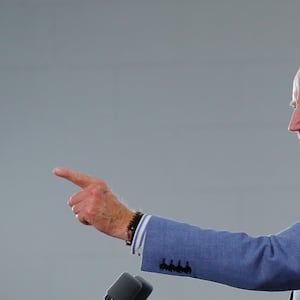Joe Biden’s nostalgic invocation of two southern segregationist senators at a fundraiser on Tuesday night has sparked the most heated exchanges to date in the 2020 Democratic primary, with competitors launching frontal attacks on the former vice president just a week before the first debate.
According to a pool report from the event, Biden was once again stressing the need for reaching across the aisle to reach “consensus” when he referenced serving with the late Senators James O. Eastland and Herman Talmadge, two ardent-pro segregation Democrats.
“I was in a caucus with James O. Eastland,” Biden said, according to a pool report from the scene. “He never called me ‘boy,’ he always called me ‘son.’”
ADVERTISEMENT
Biden went on to say that “a guy like Herman Talmadge, one of the meanest guys I ever knew, you go down the list of all these guys. Well, guess what? At least there was some civility. We got things done. We didn’t agree on much of anything. We got things done.”
The comments, which were reportedly something Biden’s own advisers had warned him not to make, provoked a sharp response from Sen. Cory Booker (D-NJ), one of three African-Americans seeking the 2020 presidential nomination.
“You don’t joke about calling black men ‘boys,’” Booker said in a statement on Wednesday. “Men like James O. Eastland used words like that, and the racist policies that accompanied them, to perpetuate white supremacy and strip black Americans of our very humanity.”
Booker went on to condemn Biden for citing the relationships and said he was saddened the former VP hadn’t apologized.
“I have to tell Vice President Biden, as someone I respect, that he is wrong for using his relationships with Eastland and Talmadge as examples of how to bring our country together,” he wrote. “And frankly, I’m disappointed that he hasn’t issued an immediate apology for the pain his words are dredging up for many Americans. He should.”
Sen. Elizabeth Warren (D-MA) told the Washington Post: “I’m not here to criticize other Democrats, but it’s never okay to celebrate segregationists. Never.” And Sen. Kamala Harris (D-CA), who would be the party’s first African-American female nominee responded, “It concerns me deeply. If those men had their way, I wouldn’t be in the United States Senate and on this elevator right now.” Sen. Bernie Sanders (I-VT) tweeted that he agreed with Booker’s statement.
And New York City Mayor Bill de Blasio, whose wife is African-American, also lit into Biden in a tweet featuring a picture of his family.
On Wednesday evening, Biden pushed back on the notion that he was waxing nostalgic for his segregation-loving colleagues and lashed out at Booker in particular in a video posted by CBS News.
“Apologize for what? Cory should apologize, he knows better,” Biden said. “There’s not a racist bone in my body, I’ve been involved with civil rights my whole career. Period. Period. Period.”
The rebukes marked what seemed at first blush to be a new chapter in the Democratic primary, one in which the lower tier candidates felt little hesitation about ripping into their party’s current frontrunner. It also again exposed the vulnerabilities that Biden carries with him in this cycle.
Biden has a long history of praising former colleagues in the U.S. Senate who opposed civil rights. During a 1985 birthday celebration of Sen. John Stennis, a fellow Democrat and signatory of the “Southern Manifesto,” which urged public and political resistance to desegregation in public schools, Biden called the Mississippian “an opponent without hate” and “a private citizen without wrong... a man without guilt.”
Biden’s time in the Senate during the ’70s is also fraught with complications for the votes he cast. He was publicly skeptical, if not opposed, to busing efforts to diversify school districts and even cast a vote (along with the entirety of the chamber) to restore citizenship to Jefferson Davis, the president of the confederacy.
Biden’s defenders have argued that those are debates and votes of a bygone era, long before he won a lifetime achievement award from the National Action Network this year. And they stressed that what he said on Tuesday was not comparable to praising a segregationist.
House Majority Whip James Clyburn (D-SC) said on Wednesday, “I worked with Strom Thurmond all my life. “You don’t have to agree with people to work with them.”
In the '70s as well, Biden co-sponsored an extension of the Voting Rights Act—going up against Thurmond on that front—battled Sen. Jesse Helms when he blocked the VRA extension, and voted to create Martin Luther King day in the '80s when Helms and Stennis voted no.
They also note that the former vice president has also at times criticized other politicians for whitewashing or excusing the segregationist legacy of some Senate colleagues. When Sen. Trent Lott, then the Senate Minority Leader, suggested during a 2002 birthday party for ardent segregationist Sen. Strom Thurmond that the country would have been better off had Thurmond been elected president, Biden blasted Lott’s comments as “insensitive as hell” and “very offensive.”
“Race is serious stuff,” Biden said at the time. “It’s not something you kid about.”
—Scott Bixby contributed reporting






